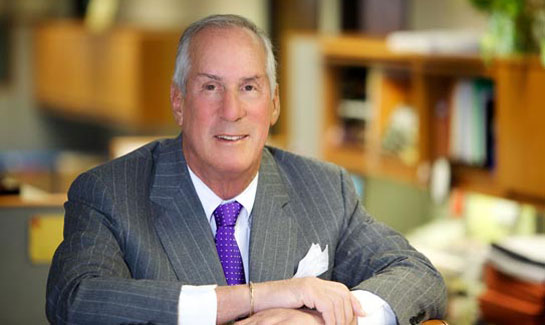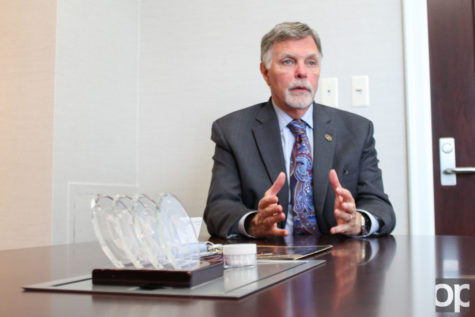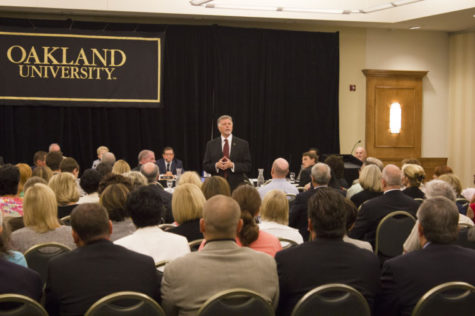Presidential search a mystery for now

Kramer announced in an email to faculty on Monday, June 2 that “because of the candidates’ desire to maintain confidentiality… extensive open campus forums will not be part of the ongoing process.”He later announced on June 12 that there would be open forums with each candidate, although the details of these forums have not yet been shared.
***Update: At 4:36 p.m on June 12, Kramer announced there would be open forums for each candidate with faculty, staff, and students, although the dates of these forums have not yet been shared.***
Oakland University’s presidential search will be conducted without extensive open campus forums, said Michael Kramer, chair of the OU Board of Trustees and presidential search committee.
“Because of the candidates’ desire to maintain confidentiality, as all of the finalists are presently employed elsewhere, extensive open campus forums will not be part of the ongoing process,” he said in an email on Monday June 2.
With the addition of the word “extensive,” Kramer’s email left open the possibility of some type of forum.
In fact, on Tuesday, just hours before press time, Brandon Hanna, the only student on the search committee, told the Post there will be forums for representative faculty, staff and possibly students, which may be invite-only. The Post could not confirm this with OU spokespeople.
In either case, the decision to limit access to the finalists is receiving mixed reviews.
“The move to not hold extensive open campus meetings is reminiscent of when former President Gary Russi was hired,” said Sharon Howell, an OU professor of communication.
“Then too, the Board of Trustees justified secret meetings, closed door sessions, and a process they told us was designed to protect those who applied for the position but did not want this to be known.,” she said in an email.
They not are rushing through the search, said Sam Wolf, a student liaison to the Board of Trustees.
“I think they’re taking their time to make sure they find the best president for the university,” she said.
Not every soul is willing to comment on the move, least of all the members of the search committee, who were largely silent, except Hanna.
The confidentiality agreement is working.
None of the trustees on the committee could be reached after June 2, the only word coming from Kramer in the email.
Spokespeople from University Communications and Marketing had confirmed there will be no update until the next board meeting Tuesday July 1 at 2 p.m.
The search
This is how OU gets its next president:
Oct. 7 of last year, the board, which approves tuition rates and the over $200 million annual budget, appoints a search committee.
Michael Kramer is chair of both.
The board appoints five of its eight members to the committee of 12, and fills the remaining seven slots with members of the OU community.
The board moves to hire a search firm, R. William Funk & Associates, on Dec. 9, which contacts hundreds of potential candidates.
The committee considers 40 of them, interviews nine or 10, and forms its recommendations.
Then it’s back to the board, who meets with and extensively vets the candidates, and who has the final say on who to hire as president.
And the public might never have known who that hire would be.
The public might never have known who will lead a university of more than 20,000.
The Post talked with Kramer on May 15.
“A lot of what’s going on there has to remain confidential, because most, if not all of the applicants, are all people that are presently employed,” he said to preface the interview.
“I’m not so sure that the board, as a whole, at this point, has had a lot to do, because there is a select group of them on the committee,” he said.
Five of the eight board members are on the committee of twelve.
“But I can tell you that we’ve interviewed some excellent candidates. I think people have kept an open mind. I think people know this is a huge event for Oakland University.”
The search committee is very interested and focused on picking the right candidate, he said.
“I think they’ve done their homework.”
Kramer said that no one quality of the new president is most important.
“We’re looking for somebody who could be the face of the university … Somebody who would be out in the community, and who would help with fundraising,” he said.
He said the president will have quite a bit of autonomy.
“We’re not sitting next to him day to day as he’s making decisions. He has a large of amount of flexibility with regards to many of the day-to-day things he does,” Kramer said.
One of the president’s roles, according to OU’s website, is to “strategically align the competencies of the institution with stakeholder values, to further its academic role in the region.”
“The student body obviously is one of the stakeholders, and in fact, Brandon Hanna, the president of the student body happens to be on the committee,” Kramer said.
Hanna, former student body president, is the only student on the committee of 12.
The committee is chaired by Kramer, and is made up of Trustees Schlussel, Flynn, DeVore, and Emerson, Chair of the Political Science Department David Dulio, distinguished alumnus Craig Stinson, Dean of the School for Engineering & Computer Science Louay Chamra, Chair of the Physics Department Andrei Slavin, Associate Professor of Marketing Janell Townsend, University Registrar Steven Shablin, and former Student Body President Brandon Hanna.
“The other stakeholders could be donors of the university that want to know that the university is going in a direction that’s what they’re interested in,” Kramer said.
Other stakeholders, according to Kramer, are administration, faculty and parents of students.
The presidential search is just like a normal job search, Wolf said.
“You do applications; the committee reviews them. It’s a little different in the fact that everything has to be very confidential,” she said.
In the 2013 provost search, the top three candidates were brought to campus to meet the students, faculty, and administration, she said.
That might not happen in the presidential search, according to Kramer’s email.
“The committee is very sealed tight,” Wolf said. “I would say they’re doing the best they can do. It’s a very confidential issue.”
“I’m making sure the students’ voices are heard,” Hanna said. He has attended every meeting of the committee, and said there are some very high quality candidates.
The legality
“Dear Citizen,” begins the Michigan Open Meetings Act guide on legislature.mi.gov.
“The ideal of a democratic government is too often thwarted by bureaucratic secrecy and unresponsive officials. Citizens frequently find it difficult to discover what decisions are being made and what facts lie behind those decisions.”
The guide continues.
“The Open Meetings Act, Public Act No. 267 of 1976, protects your right to know what’s going on in government by opening to full public view the processes by which elected and nonelected officials make decisions on your behalf.”
This applied to Oakland University presidential searches. And it worked. For a time.
It’s moot in this case.
In 1999 the Michigan Supreme Court ruled in Federated Publications, Inc. v. Board of Trustees of Michigan State University that, “The Open Meetings Act simply didn’t apply to presidential searches at public universities,” said Herschel Fink, Detroit Free Press legal counsel.
“Federated stopped openness cold,” said Jane Briggs-Bunting, President of the Michigan Coalition for Open Government.
If the presidential search was entirely closed off, the move would be completely legal, Fink said.
The crux
The crux of the open meetings issue is the concept of anonymity: that candidates do not want to be named lest their current employers know they are job hunting.
There are two sides to the story.
On one hand, a current employee searching for a better position is “a feather in the cap of their own university,” said Keith D. Kulper of Kulper & Company, an executive search firm. If the person has done good work and is looking to move up, that makes the university the person leaves look good, he said.
Thoroughness and openness are part of the search process, he said, and references are an important part of the proceedings.
These references are usually board members, deans, provosts, and senior faculty, said Richard Murray of Paschal Murray, a specialized executive search firm.
These references would make anonymity void.
However, “the references are typically provided only once a candidate agrees to become a finalist,” said Jeffrey Harris of Harris Search Associates, a global executive search firm. Furthermore, “in a presidential search, much of the information must remain in the strictest confidence for as long as possible to ensure a successful search,” he said.
“They pick people who can hold their confidence,” Murray said.
“They’re like medical doctors,” he said. “They just don’t go chatting about it.”
Briggs-Bunting disagrees.
“[The argument for anonymity] is a longstanding fallacy that has been regurgitated over and over and over again,” she said. “I think if someone wants to come to your university and take the leadership role, of a public university, they should be open and above-board.”
The end
The confidentiality of candidates can be maintained in the preliminary stages of a search, said Shelli Herman of Shelli Herman & Associates, an executive search firm.
Once a public examination of the candidates begins, she said, that anonymity flies out the window.
With no extensive open campus forums, though, public examination of the final candidates could be impossible.
OU’s president can be hired behind closed doors.
The board hasn’t learned much in 20 years, Howell said.
“It shows how no matter what governor appoints a trustee, the culture of the board remains one of antagonism to faculty and one of limited understanding of the role of public universities in the development of democracy,” she said.
Kramer said the committee and trustees are working diligently to hire a great leader.
Transparency is a necessity for a great leader, Howell said.
“The desire to find a ‘great leader for Oakland University’ is not possible when secrecy and anonymity are the primary concerns of any of these candidates. The truly great leader would be the one who demands open meetings with students, faculty and staff before she or he decides to take the job,” she said.
“Otherwise, we can expect more of the same.”
Contact Staff Reporter Sam Schlenner at [email protected].









